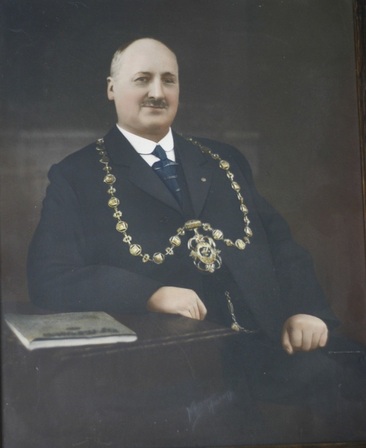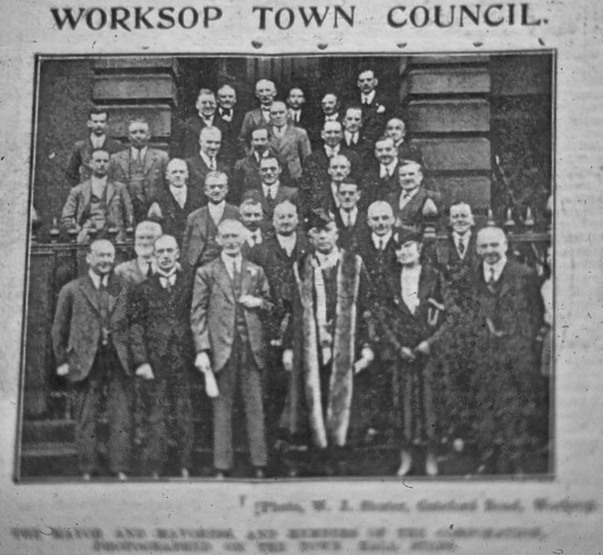Photos above: Left: Ebenezer (Ebby) CE Botham; Centre: L-R Annie Jane, Ebby, & Margery; Right: Annie Jane Lucas Botham
One - Charles' Parents
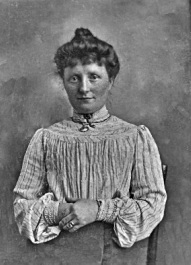
Annie Jane a young school mistress
Charles Lucas Botham, was one of two children born to Annie Jane Lucas and Ebenezer Charles Elliott Botham. Annie Jane, whose father and grandfather had emigrated from Ireland to England, was a diminutive girl of 4 feet 11 inches, who had been born in Preston, Lanca-shire. She came from a home where, according to the 1871 census taken when she was one year old, her father was not resident with her or her mother. According to the story that was passed on he died at quite a young age, so we can assume that She and her mother were still together in 1891 when she was 21 years old, her mother then being shown as a widow. As her mother was not listed during the census of 1901 we must assume that she had died in the intervening decade.
From the information gleaned from these censuses It would appear that Annie Jane had thus been orphaned in her early twenties and her parents had died at relatively young ages. We do know that after her mother's death her two maiden aunts were willing to support and nurture her in her growth and development as she matured.
These aunts, Lydia and Grace, along with Annie Jane's mother Mary, were daughters of Richard Singleton a publican, or public house operator in Preston, a small city north of Liverpool. Another sister, Elizabeth, who had married the son of one of Preston’s grocers, had become mayoress when her husband was elected the mayor of Preston.
For the post-secondary part of her education Annie Jane had been sent to the Ripon College in Yorkshire, where she was trained as a classroom teacher. As it happened, this was the same school where Maria, one of the sisters of Ebby Botham was also registered. Maria thought these two "lonely" people would benefit from each other’s company, so she somehow arranged their meeting. When they met, each must have been favourably impressed by the other! Thus it was as a result of Maria's matchmaking that the two were eventually married. Unfortunately virtually nothing is known of their courtship or their early years.
During Charles' early boyhood these aunts were still alive. In those days he often went with his mother when she went to visit them. In time, after he had left school and was working with his father, he would drive to Lytham or Blackpool in the company of a group of friends, and they all would enjoy the variety of activities at the seaside. We are not told where they stayed when they were there. Perhaps their outings were mainly day trips, and, using their cars, which just then were becoming more common, they could have returned home in the evening.
From the information gleaned from these censuses It would appear that Annie Jane had thus been orphaned in her early twenties and her parents had died at relatively young ages. We do know that after her mother's death her two maiden aunts were willing to support and nurture her in her growth and development as she matured.
These aunts, Lydia and Grace, along with Annie Jane's mother Mary, were daughters of Richard Singleton a publican, or public house operator in Preston, a small city north of Liverpool. Another sister, Elizabeth, who had married the son of one of Preston’s grocers, had become mayoress when her husband was elected the mayor of Preston.
For the post-secondary part of her education Annie Jane had been sent to the Ripon College in Yorkshire, where she was trained as a classroom teacher. As it happened, this was the same school where Maria, one of the sisters of Ebby Botham was also registered. Maria thought these two "lonely" people would benefit from each other’s company, so she somehow arranged their meeting. When they met, each must have been favourably impressed by the other! Thus it was as a result of Maria's matchmaking that the two were eventually married. Unfortunately virtually nothing is known of their courtship or their early years.
During Charles' early boyhood these aunts were still alive. In those days he often went with his mother when she went to visit them. In time, after he had left school and was working with his father, he would drive to Lytham or Blackpool in the company of a group of friends, and they all would enjoy the variety of activities at the seaside. We are not told where they stayed when they were there. Perhaps their outings were mainly day trips, and, using their cars, which just then were becoming more common, they could have returned home in the evening.
Ebby's background
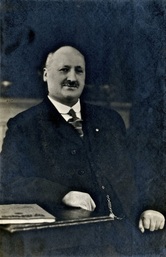
Ebenezer Charles Elliott Botham
Eben or Ebby had been born and grew up on Chanderhill Farm west of Chesterfield, in the district of Brampton, Derbyshire. His formative years were that of any boy growing up on a farm – working with farm animals in which he showed an exceptional aptitude in handling horses, coping with a variety of practical situations, and helping his father solve the problems of crops and husbandry. Gifted with a natural ambidexterity, he did many of the interesting things available to a boy living in the country, one type of activity being making things that worked. Accordingly, an interest, that he shared with his friends, was that of constructing bows and arrows which they enjoyed shooting at incidental targets, and, no doubt, even small game. Unfortunately he and his friends weren’t always careful, for it must have been during one of their games in which they began shooting at each other, that the unthinkable happened. Ebby was struck in the eye with an arrow, with the result that he lost the eye and for the rest of his life he used a prosthetic, or glass eye. To all intents and purposes the loss of this eye never seemed to slow him down, for he worked with wood, building furniture, eventually completing his apprenticeship as a furniture maker..
Eben was a big boy for his age, and although very kind and generous, had a stubborn streak in his character. Thus he was inclined to hold fast to his own ideals, and be intolerant of criticism or opposition. While still in school in his early teens his educational career fell victim to his own recalcitrance. At the age of fifteen, in a fit of temper over being disciplined for a minor misdemeanor, he struck his schoolmaster, and was permanently expelled from school.
In those days if a boy was not to go on to obtain a higher education he still had a few options. He could become either a farm worker or a factory worker, both of which promised little return or future; he could join a family business if there was one; or he could take an apprenticeship in one of the handicraft trades. Although Ebby's father, William Drabble Botham, indeed had a family business, being a successful auctioneer, land valuer and estate agent (realtor) in Chesterfield, Ebby had five brothers all older than he was. This meant, of course, that there could not possibly be a position for all of them in the business. So joining the family firm was out of the question. Actually, the opportunity to join the family business had been extended to his two eldest brothers, so Ebby, who was the youngest son, chose to apprentice to a local furniture maker who also retailed furniture and household items. These were the circumstances, as we understand them, of how he became involved with Eyres, the furniture company with which he would be involved for the rest of his life.
Eben was a big boy for his age, and although very kind and generous, had a stubborn streak in his character. Thus he was inclined to hold fast to his own ideals, and be intolerant of criticism or opposition. While still in school in his early teens his educational career fell victim to his own recalcitrance. At the age of fifteen, in a fit of temper over being disciplined for a minor misdemeanor, he struck his schoolmaster, and was permanently expelled from school.
In those days if a boy was not to go on to obtain a higher education he still had a few options. He could become either a farm worker or a factory worker, both of which promised little return or future; he could join a family business if there was one; or he could take an apprenticeship in one of the handicraft trades. Although Ebby's father, William Drabble Botham, indeed had a family business, being a successful auctioneer, land valuer and estate agent (realtor) in Chesterfield, Ebby had five brothers all older than he was. This meant, of course, that there could not possibly be a position for all of them in the business. So joining the family firm was out of the question. Actually, the opportunity to join the family business had been extended to his two eldest brothers, so Ebby, who was the youngest son, chose to apprentice to a local furniture maker who also retailed furniture and household items. These were the circumstances, as we understand them, of how he became involved with Eyres, the furniture company with which he would be involved for the rest of his life.
Ebby joins Eyre and Sons Furniture Ltd.
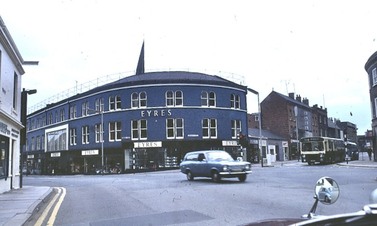
Eyre's in Chesterfield - note the crooked spire (on the parish church)
In about 1888, at the age of 15, Ebby was apprenticed as a furniture maker to Eyre and Sons, a local furniture company in Chesterfield, a small city in North Derbyshire. At that time not only did Eyres retail goods purchased from wholesalers and manufacturers, they supplied made to order furniture built in their own shops.
During the time that he was ap-prenticed Ebby not only learned the basic skills of making furniture but in time had absorbed both the skills of management and the basics of operating the business and each of its departments. In learning the techniques of management, he also learned to value the principle embodied in the Earl of Chesterfield's oft repeated quotation: “If a job’s worth doing, it’s worth doing well!” And one story that has achieved a legendary status in his family concerns an event which happened when he was working on one of the company delivery vans.
The order to be filled was for a small piano to be delivered to an upstairs apartment. When the van and its crew got to the home to which was to be delivered, they discovered that the upstairs apartment could only be accessed by a narrow winding staircase. This presented a problem because in such conditions there was no way that the piano could be delivered. However, after looking the situation over from all angles, Eben decided what he would do. The apartment had nice large windows, so he found himself a very sturdy ladder, and after opening one of the windows wide, and using some heavy rope which they had in the van, he created a sling, into which he fitted the piano. Then he slung the piano on his back, climbed the ladder with it, and went in the window. It was delivered!
During the time that he was ap-prenticed Ebby not only learned the basic skills of making furniture but in time had absorbed both the skills of management and the basics of operating the business and each of its departments. In learning the techniques of management, he also learned to value the principle embodied in the Earl of Chesterfield's oft repeated quotation: “If a job’s worth doing, it’s worth doing well!” And one story that has achieved a legendary status in his family concerns an event which happened when he was working on one of the company delivery vans.
The order to be filled was for a small piano to be delivered to an upstairs apartment. When the van and its crew got to the home to which was to be delivered, they discovered that the upstairs apartment could only be accessed by a narrow winding staircase. This presented a problem because in such conditions there was no way that the piano could be delivered. However, after looking the situation over from all angles, Eben decided what he would do. The apartment had nice large windows, so he found himself a very sturdy ladder, and after opening one of the windows wide, and using some heavy rope which they had in the van, he created a sling, into which he fitted the piano. Then he slung the piano on his back, climbed the ladder with it, and went in the window. It was delivered!
Ebby sets up a new branch of Eyre's
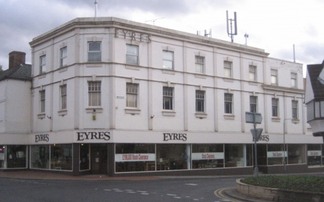
Recent photo of Eyre and Sons in Worksop - note the name change
As he grew and matured his employers became very impressed by the talents and dedication of the young man and eventually, possibly with his father influencing them, invited him to join the ownership of their firm. At the time they were going through a phase where they desired to expand so Ebby was invited to set up a branch of the company in Worksop, a small town in northern Nottinghamshire, only about 15 miles east of Chesterfield.
For a young man starting out, to share in the ownership of a business still required the investment of some capital. In Ebby’s case it has never been revealed as to where he obtained the money necessary to buy a part ownership in the company, but one possibility is that his young wife Annie Jane had brought funds that she had inherited into the marriage.
Alternatively, and more likely, he probably obtained at least part of the capital he needed, either as a gift or as a loan, from his father. Or perhaps it was a combination of the two. In any case, because his employer had great confidence in his character and abilities, he was invited to join the company, and build a branch in Worksop, of which he became the managing director. A final word: People said in awed tones after Ebby joined the firm, "No-one else has ever been invited to join Eyres!"
For a young man starting out, to share in the ownership of a business still required the investment of some capital. In Ebby’s case it has never been revealed as to where he obtained the money necessary to buy a part ownership in the company, but one possibility is that his young wife Annie Jane had brought funds that she had inherited into the marriage.
Alternatively, and more likely, he probably obtained at least part of the capital he needed, either as a gift or as a loan, from his father. Or perhaps it was a combination of the two. In any case, because his employer had great confidence in his character and abilities, he was invited to join the company, and build a branch in Worksop, of which he became the managing director. A final word: People said in awed tones after Ebby joined the firm, "No-one else has ever been invited to join Eyres!"
Living on Queen Street
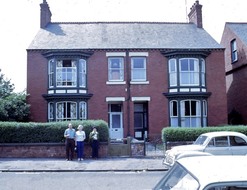
Bandhurst, 11 Queen Street in 1971
When Ebby and Annie Jane moved to Worksop to build and open up the Eyre’s branch, they first lived in Ivy Cottage, a house in Gateford, a small community on the northern edge of Worksop. It was there that Charles, and Margery, were born. When Muriel and Peter visited Worksop in 1971 they walked to Gateford and found Ivy Cottage. No-one was living there at the time and it was empty and unlocked, so they were able to enter the house and look through it. In one of the upstairs rooms they found what was left of an old “codds bottle” that had been broken across the top to get at the contents. As it appeared to be “junk” they acquired it as a souvenir, and still have it.
Note: A codds bottle is a bottle which was "pinched" near the top in the process of making it, when the glass was molten. A round "marble" was trapped in the top below the pinch which was used to prevent gases escaping that naturally build up in the drink. Codd's patent bottle was one approach to keeping the fizz in the bottle which rapidly became very successful, and was widely used in Britain for over 60 years. The stopper was the glass ball in the neck of the bottle. The bottle was filled upside down so that the ball which fell against a rubber washer in the neck, it formed an airtight seal. Thus the pressure held the marble in place.
Not too long after their children were born, Ebby was able to move the family to a semi-detached house which, after the custom of the country, had been endowed with the name of "Bandhurst" at 11 Queen Street, near the center of town and thus be much nearer to the store. From there he didn’t have far to walk to go to work.
Although most folk in those days lived where they could walk to work, and in fact Ebby could have done so, he had acquired a bicycle, and so used that each day to get to work. He would turn left out of his house in the morning, ride north up Queen Street and turn left on Newcastle Avenue. He would proceed then proceed for a short block or so, and then turn left again on to Bridge Street along which he rode for about a block and a half in order to arrive at the Eyre & Son store which he managed, and in which he was now a significant shareholder. It was not very far, a distance which he could easily have walked.
Note: A codds bottle is a bottle which was "pinched" near the top in the process of making it, when the glass was molten. A round "marble" was trapped in the top below the pinch which was used to prevent gases escaping that naturally build up in the drink. Codd's patent bottle was one approach to keeping the fizz in the bottle which rapidly became very successful, and was widely used in Britain for over 60 years. The stopper was the glass ball in the neck of the bottle. The bottle was filled upside down so that the ball which fell against a rubber washer in the neck, it formed an airtight seal. Thus the pressure held the marble in place.
Not too long after their children were born, Ebby was able to move the family to a semi-detached house which, after the custom of the country, had been endowed with the name of "Bandhurst" at 11 Queen Street, near the center of town and thus be much nearer to the store. From there he didn’t have far to walk to go to work.
Although most folk in those days lived where they could walk to work, and in fact Ebby could have done so, he had acquired a bicycle, and so used that each day to get to work. He would turn left out of his house in the morning, ride north up Queen Street and turn left on Newcastle Avenue. He would proceed then proceed for a short block or so, and then turn left again on to Bridge Street along which he rode for about a block and a half in order to arrive at the Eyre & Son store which he managed, and in which he was now a significant shareholder. It was not very far, a distance which he could easily have walked.
Ebby and the Long Arms of the Law
When Peter and Muriel were visiting in 1971, Ebby's daughter Margery told them about an incident which had happened to Ebby one morning as he was going to work.
In those early days of the automobile, because there were so few vehicles, few towns needed traffic lights. Instead at certain times of the day traffic policemen were relied on to control traffic at intersections.
One morning as Ebby was going to work, he had ridden down Queen Street, turned left and ridden along Newcastle Street. He was just in the process of turning left around the traffic policeman on to Bridge Street, when his overstressed bicycle fell apart. It just separated into two pieces! Of course, if, as you’re riding your bike and it falls into two pieces, you quickly hit the ground which can create a few tender areas on your body. But in Ebby’s case, because as this happened just as he was rounding the policeman, he happened to fall right towards that person who grabbed him as he was falling, wrapped his arms around him and gasped, “’Ere now, Mr. Botham, we can’t ‘ave you fallin’ doun ere, can we?” and saved him from falling to the pavement. His descendants aren’t sure as to why Ebby’s bicycle fell apart, but it could have been related to the fact that in his mature years he was well over 300 lbs. This is a story which over the years has passed from one family member to another and has probably had added a detail or two, but that’s how this author heard it.
A further tale which illuminates the awkwardness which his single eye must have left him with, has recently been related by the daughter of one of the occasional housemaids of the family. This daughter, today a university professor, related a story told by her mother about her employer. It seems that Ebby, in his senior years, often drove to work in his car. Wishing to park his car in the service yard behind the store, he would drive to the gateway, and turn to go in. However, several times when he was about to pass through the gate he happened to hit the gatepost with his bumper. At times like those he probably realized that he missed Charles' presence in the business for more reasons than just as a partner.
In those early days of the automobile, because there were so few vehicles, few towns needed traffic lights. Instead at certain times of the day traffic policemen were relied on to control traffic at intersections.
One morning as Ebby was going to work, he had ridden down Queen Street, turned left and ridden along Newcastle Street. He was just in the process of turning left around the traffic policeman on to Bridge Street, when his overstressed bicycle fell apart. It just separated into two pieces! Of course, if, as you’re riding your bike and it falls into two pieces, you quickly hit the ground which can create a few tender areas on your body. But in Ebby’s case, because as this happened just as he was rounding the policeman, he happened to fall right towards that person who grabbed him as he was falling, wrapped his arms around him and gasped, “’Ere now, Mr. Botham, we can’t ‘ave you fallin’ doun ere, can we?” and saved him from falling to the pavement. His descendants aren’t sure as to why Ebby’s bicycle fell apart, but it could have been related to the fact that in his mature years he was well over 300 lbs. This is a story which over the years has passed from one family member to another and has probably had added a detail or two, but that’s how this author heard it.
A further tale which illuminates the awkwardness which his single eye must have left him with, has recently been related by the daughter of one of the occasional housemaids of the family. This daughter, today a university professor, related a story told by her mother about her employer. It seems that Ebby, in his senior years, often drove to work in his car. Wishing to park his car in the service yard behind the store, he would drive to the gateway, and turn to go in. However, several times when he was about to pass through the gate he happened to hit the gatepost with his bumper. At times like those he probably realized that he missed Charles' presence in the business for more reasons than just as a partner.
Ebby's roots were on the farm
Another recollection that Charles had about his father concerned the horses used in the early days of the business to draw the company's furniture delivery wagons, which was before the company had succumbed to the use of gasoline engine driven vans. They used the large draught horses, such as Clydesdales or Shires to pull the heavy vans. Of course, Ebby was already a director of Eyre & Sons, and manager of the Worksop operation. As such you would expect that he might have separated himself from the day-to-day operation of the delivery department. But, no, the story goes that whenever the teamsters employed by the company had a big horse that was acting up or wouldn’t settle down Ebby would be called down to the horse barn to deal with it. He had had a great deal of experience with draught horses on his father’s farm as he was growing up. Combining his own gentle nature with his great personal strength and weight, he was usually able to calm an excited animal when it was acting up.
Another indication of how Ebby’s farming roots had remained a significant part of his character was the fact that one of his hobbies in which he engaged for rest and relaxation was in raising chickens and enjoying the resulting eggs. In those days, a few doors from their home on Queen Street were a couple of empty lots, one of which he rented for this activity. Today in Canadian cities we have many citizens who are worried about the presence of chickens in an urban space. In those days in England it was obviously an accepted practice to produce your own eggs in this manner.
Another indication of how Ebby’s farming roots had remained a significant part of his character was the fact that one of his hobbies in which he engaged for rest and relaxation was in raising chickens and enjoying the resulting eggs. In those days, a few doors from their home on Queen Street were a couple of empty lots, one of which he rented for this activity. Today in Canadian cities we have many citizens who are worried about the presence of chickens in an urban space. In those days in England it was obviously an accepted practice to produce your own eggs in this manner.
Annie and Ebby at the seaside!
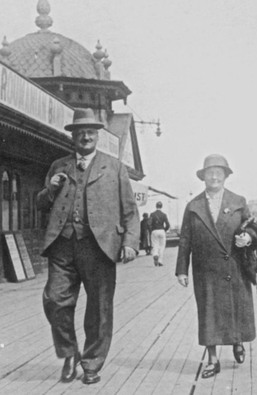
Ebbie and Annie Jane on the Boardwalk at Blackpool
And at home this gentle 300 lb. giant was ruled by Annie Jane, his tiny auburn haired wife. We understand that she had the fiery temper reputed to persons of red hair, and often, following an episode where she demon-strated that she would like her wishes followed, he was known to emphatically exclaim, “I’m just a cipher in my own house!” – a cipher, of course, being some symbol standing for the real thing. In effect this was a statement that in spite of supposedly being the head of the house, he was merely a figure-head and devoid of any "power".
Going to Blackpool & other seaside locations, accom-panied by Ebby, was one of Annie Jane’s favourite forms of recreation. She had come from the Lytham-St. Ann area on the Lancashire coast north of Liverpool, where, after her mother had died, she had lived with her aunts. As Charles grew through his teen years, he became aware that his mother suffered from an ailment which she called her “nerves”. Over several weeks she would become very anxious and fretful, and then announce her need to “get away”. For years Charles, who had never suffered from any such affliction, thought that she must be just “making it up”. But when, time after time, she would come home, much more relaxed than she had been before leaving, he realized that her problem must be real and the solution for coping was the seaside visit. Thus, as Charles had grown up, the family had often made the trek to the seaside for their holidays.
Going to Blackpool & other seaside locations, accom-panied by Ebby, was one of Annie Jane’s favourite forms of recreation. She had come from the Lytham-St. Ann area on the Lancashire coast north of Liverpool, where, after her mother had died, she had lived with her aunts. As Charles grew through his teen years, he became aware that his mother suffered from an ailment which she called her “nerves”. Over several weeks she would become very anxious and fretful, and then announce her need to “get away”. For years Charles, who had never suffered from any such affliction, thought that she must be just “making it up”. But when, time after time, she would come home, much more relaxed than she had been before leaving, he realized that her problem must be real and the solution for coping was the seaside visit. Thus, as Charles had grown up, the family had often made the trek to the seaside for their holidays.
Ebby in Politics
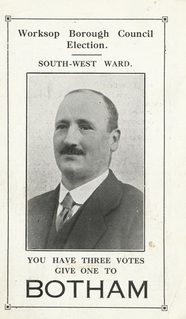
A handbill used in Ebby's campaign
In 1931 Ebby was urged to run for public office on the town council. He had already had some experience in local politics being elected at an earlier election to the Urban District Council. So in 1931 he allowed his name to be put forth, and in the ensuing election was successful, winning a seat as counsellor, at which he spent a term of office. While normally of a retiring dis-position he did have a public conscience, and being one of the town’s employers with a substantial number of employees, had considerable influence in the town’s affairs. The issues before council during his period of office have not been made plain, but some photos have been preserved of an event or two he attended in his official capacity – which included the Lord Mayor’s Banquet. As well as being a member of the Wesleyan Church, he was also a member of the Worksop Rotary Club, the Chamber of Trade, and a number of other organizations.
His campaign statement for the “Worksop Borough Council Election”, dated Monday November 2nd, 1931, went like this:
“To the Electors of the South-West Ward. Ladies and Gentlemen,
At the request of a large number of Electors, I beg to offer myself as a Candidate for a seat on the first Borough Council. Connected, as I am, with a firm who are large Ratepayers in the Ward, employing a considerable amount of labour, my interests are bound up in the welfare and prosperity of the Town.
I do not believe in making a lot of election promises, but am desirous of serving you to the best of my ability. Being well known to many of you, I need only say, that if honoured with your vote and confidence, my aim will be to follow a course similar to that taken when a member of the Urban District Council, namely - to take independent action and vote without fear or favour on all matters coming before the Council.
Remember that you have 3 votes on this occasion-please give one of those to
Yours faithfully.
E. C. E. Botham, Worksop”
`````````````````````````````````````````````````````````````````````````````````
In the position of counsellor Ebbie became intimately acquainted with many of the issues and problems of the town. In the performance of his duties he attended some interesting meetings where prominent personages from distant cities were guests, and participated in ways which must have seemed quite novel to a former farm boy.
When Ebbie died in 1946, the local newspaper gave an account of the funeral opened by: “There was a particularly large attendance at the funeral at Worksop on Friday, of Mr. Ebenezer Charles Elliott Botham, whose passing at the age of 73, following a long illness, occurred on the Tuesday, and was recorded with regret in our last issue."
His campaign statement for the “Worksop Borough Council Election”, dated Monday November 2nd, 1931, went like this:
“To the Electors of the South-West Ward. Ladies and Gentlemen,
At the request of a large number of Electors, I beg to offer myself as a Candidate for a seat on the first Borough Council. Connected, as I am, with a firm who are large Ratepayers in the Ward, employing a considerable amount of labour, my interests are bound up in the welfare and prosperity of the Town.
I do not believe in making a lot of election promises, but am desirous of serving you to the best of my ability. Being well known to many of you, I need only say, that if honoured with your vote and confidence, my aim will be to follow a course similar to that taken when a member of the Urban District Council, namely - to take independent action and vote without fear or favour on all matters coming before the Council.
Remember that you have 3 votes on this occasion-please give one of those to
Yours faithfully.
E. C. E. Botham, Worksop”
`````````````````````````````````````````````````````````````````````````````````
In the position of counsellor Ebbie became intimately acquainted with many of the issues and problems of the town. In the performance of his duties he attended some interesting meetings where prominent personages from distant cities were guests, and participated in ways which must have seemed quite novel to a former farm boy.
When Ebbie died in 1946, the local newspaper gave an account of the funeral opened by: “There was a particularly large attendance at the funeral at Worksop on Friday, of Mr. Ebenezer Charles Elliott Botham, whose passing at the age of 73, following a long illness, occurred on the Tuesday, and was recorded with regret in our last issue."
